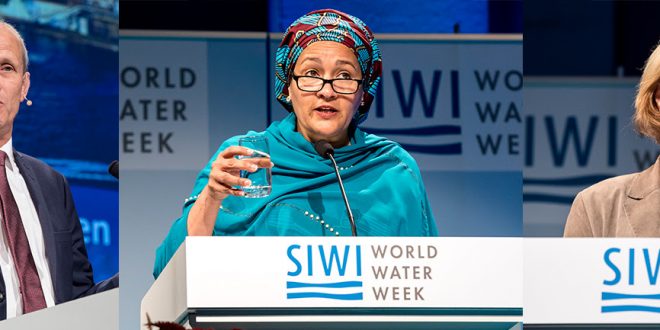Stockholm
Poor water management and stressed ecosystems cause poverty and violent conflicts. To avoid a global water crisis, more nature-based solutions are urgently needed. These were key themes during the inauguration of World Water Week 2018, which has brought world leaders, water experts, development professionals and business representatives from all over the world together in Stockholm, Sweden.
There is a growing realization that humans are increasingly vulnerable to water shortages, extreme weather and social unrest. Decades of unprecedented economic and population growth, rapid urbanization and climate change have led to stressed ecosystems and high pressure on limited water resources. In response to this, societies must find and implement solutions that work with, rather than against, nature.
World Water Week, the leading meeting-place for the global water community, is this year focused on the link between water, ecosystems and human development. A record number of 3,700 participants meet in Stockholm 26-31 August to discuss concrete solutions to the escalating water challenges.
“With the rapidly growing demand for water, it is becoming increasingly clear that water is everybody’s issue. Scarcity of water has become the new normal in so many parts of the world,” said Torgny Holmgren, Executive Director of SIWI, which organizes World Water Week.
In his welcome address on Monday, Mr. Holmgren called for a shift towards more green infrastructure solutions, noting that they are inherently multi-functional: “City parks retain rain, improve the microclimate, contribute to biodiversity – and look good doing so. Green solutions are, in addition, also often much more resilient than grey. They tend to bend rather than break under pressure. They can repair themselves and restore their functionality also after significant damage.”
H.E. Amina J. Mohammed, Deputy Secretary-General of the United Nations, talked about the strong link between environmental degradation, poverty and violent conflicts. This is not least visible in her home country Nigeria, which in recent years has suffered from terrorism: “I believe that the tragedy of Boko Haram is inextricably linked to poor water management and the solution to the conflict in the region must include equitable ways of using water resources,” she said.
As an example of the dramatic consequences of a collapsing ecosystem, Amina J Mohammed referred to Lake Chad, which has shrunk by 90 per cent, saying that “it has impacted food insecurity and is increasing the risk of water-borne diseases, but it is also causing poverty by taking away farmers’ livelihoods, especially for women. And it has a gender dimension, contributing among others to low levels of school-enrolment among our girls. Taken together, all these factors have contributed increasingly to insecurity in our region, already affected by religious extremism.”

Similar views were expressed by Åsa Regnér, Assistant Secretary-General and Deputy Executive Director, Director for the Intergovernmental Support and Strategic Partnerships Bureau, at UN Women. She described lack of water as a root cause of poverty and inequality since “only in Sub-Saharan Africa, women and girls spend 40 billion hours a year collecting water, equivalent to a year’s worth of labour by the entire workforce in France”.
Carin Jämtin, Director-General of the Swedish International Development Cooperation Agency, also talked about the relationship between poverty, conflicts and lack of clean water. “In countries affected by conflict and fragility, tensions over water increase. There is evidence that water and sanitation infrastructure have been attacked, or that the access to clean water is denied as tactic or weapon of war. Without access to clean water, children fall ill, hospitals do not function, and disease and malnutrition spread quickly. Among the threats against children in conflict, the lack of safe drinking water is one of the deadliest,” Carin Jämtin said.
Karin Wanngård, Mayor of Stockholm, pointed to the risk from populism and short-sightedness but also felt that cities were increasingly coming together to find new solutions, adding: “I hope that this week will help the global community to get closer to the goal of a sustainable world.”
Many of the speakers also expressed optimism about the increase in new solutions borrowed from nature. An inspiring example is the work of Stockholm Water Prize winners Professors Bruce Rittmann and Mark van Loosdrecht. Interviewed by SIWI’s Senior Manager International Policies, Maggie White, on how their research on environmental biotechnology has revolutionized water treatment Bruce Rittman said:
“Microorganisms live in water and when we use microorganisms we are making water a key part of the solution to many of our environmental challenges.” He added: “We want to have a merging of environmental and economic interests. We don’t want to make pollution control and environmental protection just a cost to society, we want to turn that also into a generator of resources and economic value”.
About SIWI: SIWI is an international water institute working to solve global water challenges by improving how water is used and managed. By combining its areas of expertise with its unique convening power, SIWI influences decision-makers, facilitates dialogue and builds knowledge in water issues, thereby contributing to a just, prosperous and sustainable future for all.
SIWI organizes the world’s most important annual water and development meeting, World Water Week, and it awards the Stockholm Water Prize and Stockholm Junior Water Prize.
About World Water Week: World Water Week is the leading annual event on global water and development issues. The Week brings together more than 3,500 participants from more than 130 countries representing governments, private sector, multilateral organizations, civil society and academia to shape joint solutions to global water challenges.
 الشبكة اليمنية للعلوم والبيئة (يمن ساينس) موقع يهتم بأخبار العلوم والتكنولوجيا والصحة والبيئة والسكان
الشبكة اليمنية للعلوم والبيئة (يمن ساينس) موقع يهتم بأخبار العلوم والتكنولوجيا والصحة والبيئة والسكان





